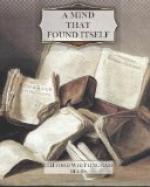The reader may well wonder in what my so-called insanity at this time consisted. Had I any of those impracticable delusions which had characterized my former period of elation? No, not one—unless an unreasonable haste to achieve my ambitions may be counted a delusion. My attention simply focussed itself on my project. All other considerations seemed of little moment. My interest in business waned to the vanishing point. Yet one thing should be noted: I did deliberately devote many hours to the consideration of business affairs. Realizing that one way to overcome an absorbing impulse is to divide the attention, I wrote a brief of the arguments I had often used when talking with bankers. In this way I was able to convince the doctors that my intense interest in literature and reform would soon spend itself.
A consuming desire to effect reforms had been the determining factor when I calmly weighed the situation with a view to making the best possible use of my impulse to write. The events of the immediate past had convinced me that I could not hope to interest people of wealth and influence in my humanitarian project until I had some definite plan to submit for their leisurely consideration. Further, I had discovered that an attempt to approach them directly disturbed my relatives and friends, who had not yet learned to dissociate! present intentions from past performances. I had, therefore, determined to drill myself in the art of composition to the end that I might write a story of my life which would merit publication. I felt that such a book, once written, would do its own work, regardless of my subsequent fortunes. Other books had spoken even from the grave; why should not my book so speak—if necessary?
With this thought in mind I began not only to read and write, but to test my impulse in order that I might discover if it were a part of my very being, an abnormal impulse, or a mere whim. I reasoned that to compare my own feelings toward literature, and my emotions experienced in the heat of composition, with the recorded feelings of successful men of letters, would give me a clue to the truth on this question. At this time I read several books that could have served as a basis for my deductions, but only one of them did I have time to analyze and note in my diary. That one was, “Wit and Wisdom of the Earl of Beaconsfield.” The following passages from the pen of Disraeli I transcribed in my diary with occasional comment.
“Remember who you are, and also that it is your duty to excel. Providence has given you a great lot. Think ever that you are born to perform great duties.” This I interpreted in much the same spirit that I had interpreted the 45th Psalm on an earlier occasion.
“It was that noble ambition, the highest and best, that must be born in the heart, and organized in the brain, which will not let a man be content unless his intellectual power is recognized by his race, and desires that it should contribute to their welfare.”




